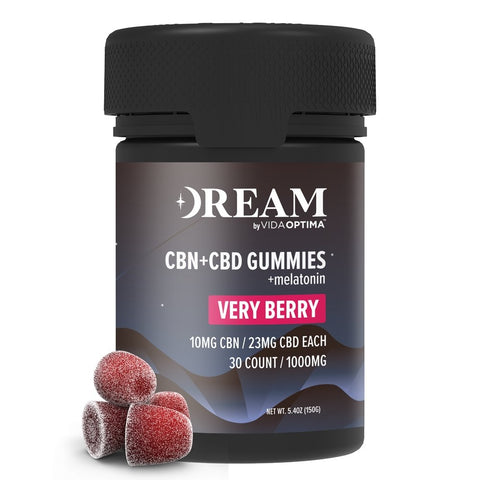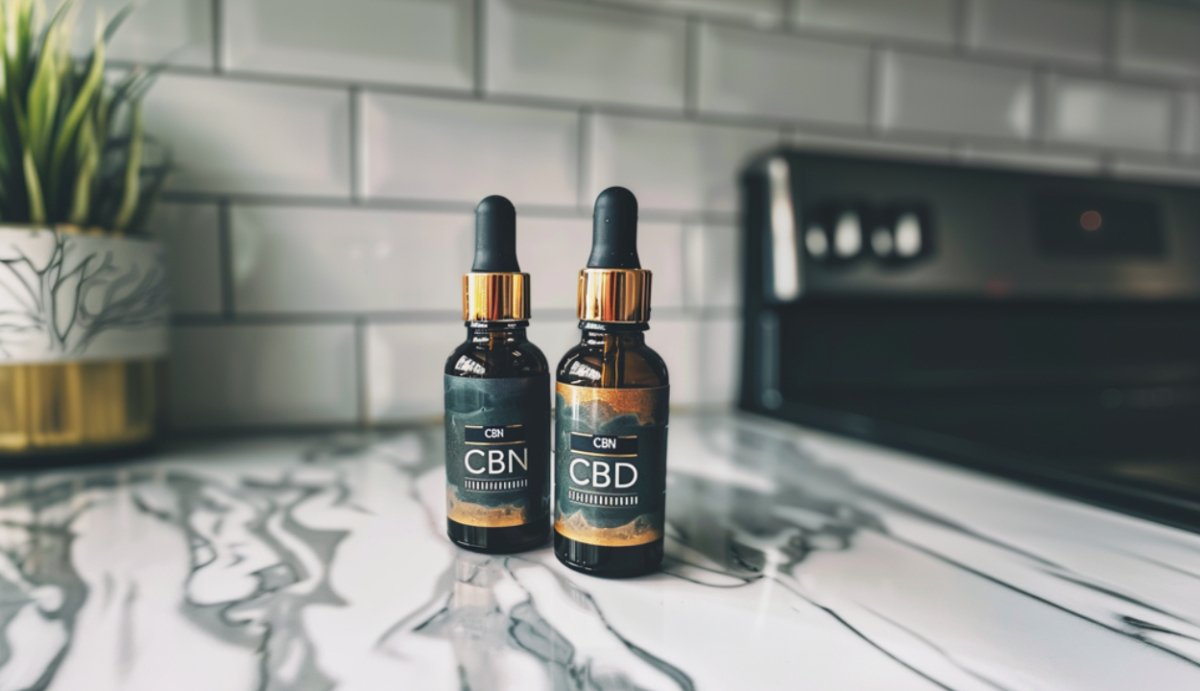Your Cart is Empty
FREE SHIPPING ON ALL ORDERS $75+
Although the two are only one letter apart, CBN and CBD are entirely different, each boasting a unique range of therapeutic benefits.
CBN is well-known for its powerful impact on mood and sleep cycles, while CBD offers a more broad spectrum approach to total wellness. And while each of these unique cannabinoids can be used alone to reap their specific benefits, they have a powerful synergy when combined–a phenomenon known as the "entourage effect."
Before we can really dig into the details, though, we need to answer the question: How do CBN vs CBD stack up?
Table of Contents
What is CBN?
What is CBD?
CBD vs CBN Benefits
CBD Research
CBN Research
CBD vs CBN Usage and Product Types
Can CBD and CBN Be Used Together?
Are CBD and CBN Legal?
Conclusion: What’s the Difference in CBD and CBN?
Resources
Cannabinol, or CBN for short, is one of the non-psychoactive cannabinoids found in hemp. However, it is produced as THC degrades, and the two cannabinoids share many properties, such as sedative-like effects, mood regulation, and possibly even pain relief. Unlike THC, however, CBN does not produce psychoactive effects, rendering it particularly useful for therapeutic purposes.
Unlike prominent cannabinoids like CBD and THC, CBN is classified as a "minor cannabinoid," because it's found only in small concentrations in hemp material.

Despite occurring at only roughly 25% of the concentration of THC, CBN was actually the first cannabinoid to be isolated in the early 1980's. Originally, researchers thought it could be responsible for the psychoactive effects we now contribute to THC.
Unlike THC, CBN is now thought to have a very low affinity for the CB1 receptor, or the portion of the Endocannabinoid System that's found in the brain and Central Nervous System that's responsible for cannabis's psychoactive effects.
Researchers believe that CBN instead binds with CB2 receptors, the portion of the Endocannabinoid System that helps regulate immune responses. For this reason, CBN is thought to have great therapeutic potential, although research is still underway.
CBD, short for cannabidiol, is definitely the better known cannabinoid of the pair, but we'll cover the basics anyways.
CBD is also a hemp-derived cannabinoid, the most common one found in hemp material, and the second most common cannabinoid (next to THC) found in the Cannabis family of plants.
It's also one of the most well researched cannabinoids to date. Just like CBN, CBD is also non psychoactive, which greatly expands its range of potential therapeutic uses.
Unlike many cannabinoids, CBD doesn't activate any receptor sites in the Endocannabinoid System. Instead, it binds to them indirectly, modifying the way that other cannabinoids interact with the system.
That means that CBD can actually interrupt the binding of Endocannabinoids, or the cannabinoids naturally found in the body. This is why CBD is believed to have pain-blocking, endocannabinoid-regulating potential.
Although CBD and CBN host a lot of similarities, they have different effects on the body because they both interact with the Endocannabinoid system differently.
Research regarding the therapeutic effects of both cannabinoids is still limited, but many researchers agree that both CBN and CBD have great potential both on their own and when used together.

CBN research has mostly centered around managing pain (specifically for chronic conditions like fibromyalgia) and inflammation, as well as CBN’s ability to combat poor appetite caused by conditions like cancer and HIV.
Most significantly, CBN is often touted for its “sedative-like effects,” which are mostly based on anecdotal evidence. One well-cited study found that a combination of CBN and THC may have sedative-like properties. Read “Does CBD Help with Sleep?” to learn more.
Because researchers believe that CBN acts on the immune-regulating portion of the Endocannabinoid System, it's likely that future research regarding CBN will explore its potential benefits for various chronic illnesses.
Compared to CBN, CBD research is much more abundant, although more research is needed before we will fully understand how to deploy CBD as a medicinal substance.
Research suggests that a variety of treatment resistant syndromes may be linked to an endocannabinoid deficiency, or a natural deficiency in important neurotransmitters, and some experts agree that CBD may help regulate this deficiency to calm chronic ailments.
The entirety of CBD research is beyond the scope of this article (you can read “What is CBD?” to learn more), but we’ll cover a few key points:

CBD has been heavily researched for it’s potential benefits for autoimmune diseases like Multiple Sclerosis, Rheumatoid Arthritis, and Psoriasis. Some research also suggests that it may have great therapeutic potential for managing a variety of Inflammatory Bowel Diseases, like Colitis.
Furthermore, CBD is thought to have neuroprotective properties that may make it beneficial for managing childhood epilepsy, Alzheimer’s Disease, and a variety of neurodegenerative disorders.
CBD has also been heavily touted for potential anti-inflammatory effects and pain-blocking benefits, and some research suggests it may offer a safer alternative to opioids in certain situations.
Similarly to CBN, CBD has also been found to potentially have a positive impact on sleep disorders, specifically anxiety-induced insomnia.
To date, CBD has been approved by the FDA for use in limited medications, mainly for managing rare forms of childhood epilepsy. CBD research is expected to continue to expand so that we can more effectively use CBD to it’s therapeutic potential.
Other than targeting specific therapeutic benefits (like choosing CBN for sleep-related ailments or CBD for managing inflammation and physical discomforts), there isn’t much difference in the way that CBN and CBD are used.
In general, both CBN and CBD are available in a wide variety of product types. The most popular product types include:
To learn about the significant difference between different dosing methods, read “CBD Product Types.”

In general, both CBD and CBN can be used for day and nighttime ailments, although CBN is more commonly used as a nighttime aid for various sleep disruptors.
The primary difference in the way that the two cannabinoids are used is that CBN is much more potent than CBD, meaning it’s often used in much smaller doses. A user may take 20-50 milligrams of CBD, but may find that a dose of 5 mg of CBN offers significant relief.
While CBN is more potent and has a more targeted impact, CBD has wider-reaching benefits that are useful in a variety of situations. CBD is the type of supplement that you work into your daily routine as a preventative and a maintenance dose. That’s why we’ve created our CBD multivitamin gummy, a one-stop daily dose that combines CBD with the essential vitamins you need to live an optimal life.
Many people are focused on the differences in CBN vs CBD, but it may not be a “one or the other” type of situation. In fact, the two may work together to provide a sort of cannabinoid synergy, a phenomenon that’s come to be known as the “Entourage Effect.”

There’s a lot to the story, but generally speaking, CBD and CBN may boost each other’s effects, especially in the areas where their potential benefits cross, like promoting relaxation and more restful sleep.
Our CBD for Sleep Collection is focused on this dynamic duo’s ability to help you unwind and combat ailments that disrupt sleep. Our CBD+CBN Dream Gummies are a popular choice for nighttime use and can help round out a daily CBD dosing routine.
Yes! CBD and CBN both fall under the "cannabinoids" portion of the definition used to legalize hemp products across the nation.
The Hemp Farming Act of 2018 officially legalized hemp and all of its derivatives, including cannabinoids, isomers, and all other extracts and derivatives. Still, states hold the power to regulate hemp at a local level, which means not all states agree with the federal stance on CBD and CBN. You'll need to check your state CBD laws to see how CBD (and likely CBN) is regulated in your state.
Here's a quick overview of how CBN vs CBD stack up:
Ultimately, the real world applications for CBN and CBD will continue to expand with the research. For now, we know that the two may have benefits on their own, but CBD and CBN may be a powerhouse combination for promoting restful sleep and combating nighttime ailments.
CBN may support relaxation and sleep, especially when used alongside other cannabinoids in full spectrum or THC-broad spectrum products. It shares many effects with THC such as muscle relaxation and inflammatory support, but unlike THC, it is non-psychoactive.
The mild psychoactive effects of CBN may offer potential relief for insomnia, anxiety, and other conditions. It's also believed to possess anti-inflammatory and antibiotic properties, although further research is needed to confirm these benefits.
Yes, the primary effect of CBN is drowsiness. Many users report experiencing deep bodily relaxation when consuming CBN.
While CBD has been associated with potential liver damage when used at high dosages, there isn't enough evidence to suggest similar risks for CBN specifically. However, it's always advisable to consult with a healthcare professional before starting any new supplement regimen.
Comments will be approved before showing up.



